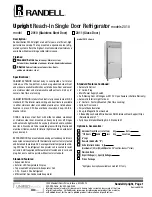
Refrigeration Service Operations
88
7. Support the compressor and remove the
compressor mounting bolts from the flywheel
housing. For a compressor with a 7-quart
sump use The Compressor Installation Tool
(P/N 204-1087) to support the compressor as
follows:
a. Identify the four machined feet on the base
of the compressor sump. The Compressor
Installation Tools bridge the lower frame
rails and support the compressor directly
under these feet.
b. Position the Compressor Installation Tools
by inserting them from the end of the
compressor and sliding them into place on
the lower frame rails. Alternatively,
position the Compressor Installation Tools
by inserting them on a diagonal from
below the compressor and twisting them
into position over the lower frame rails.
8. Lift the service valves out of the way.
9. Slide the compressor to the left until the
coupling pins are clear
, and remove the
compressor belts from Model 50 units.
10. Remove the compressor from the front of the
unit. Keep the compressor ports covered to
prevent dust, dirt, etc., from falling into the
compressor.
NOTE: When the compressor is removed
from the unit, the oil level should be noted,
or the oil removed from the compressor
should be measured so that the same amount
of oil can be added before placing the
replacement compressor in the unit.
Installation
1. If installing a 7-quart sump compressor, place
the Compressor Installation Tools on the
lower frame rails to support the compressor.
2. Slide the compressor into the unit.
3. Place the compressor in position
, install the
compressor belts on Model 50 units,
and
install the mounting bolts.
4. Install the service valves using new gaskets
soaked in compressor oil. Connect the HPCO
wires, the HPSW wires, and install the
compressor oil filter.
5. Pressurize the compressor and test for
refrigerant leaks.
6. If no leaks are found, evacuate the
compressor.
7. Back seat the suction and discharge service
valves.
8. Tighten the compressor belts on Model 50
units.
9. Operate the unit at least 30 minutes and then
inspect the oil level in the compressor. Add or
remove oil if necessary.
10. Check the refrigerant charge and add
refrigerant if needed.
Compressor Coupling Removal
1. After the compressor has been removed from
the unit, use the appropriate Allen tool
provided with removal tool P/N 204-991 (see
Figure 58 on page 89) to loosen the center
bolt, which holds the coupling to the
compressor shaft.
2. Attach the tool to the coupling with the
provided socket head screws and spacers. Two
sets of spacers are provided with the tool, use
the short spacers with shallow compressor
mounting flanges and the longer set for deeper
flanges. The side with the countersunk holes
should be toward the coupling.
3. To prevent the tool and crankshaft from
rotating, use one of the compressor to engine
mounting screws to pin the tool to the flange.
If a nut is used to prevent the bolt from falling
out, the nut should not be tightened.
4. Use the appropriate Allen tool to loosen the
coupling mounting screw.
5. Once the center screw has been loosened,
back the head against the tool and it should
push the coupling off the crankshaft as you
continuing turning the center screw in a
counter-clockwise direction. Using this tool
will prevent the coupling from popping off
because the center bolt and flatwasher will
hold it in place.
Summary of Contents for 002008
Page 4: ...4 ...
Page 30: ...Unit Description 30 Figure 9 Front View AJA920 ...
Page 31: ...Unit Description 31 1 Access Panels 2 Defrost Damper Figure 10 Back View 1 2 ARA104 ...
Page 114: ...Mechanical Diagnosis 114 ...
Page 116: ...Electric Standby Diagnosis 116 ...
Page 120: ...Remote Evaporator Specifications 120 ...
Page 122: ...Remote Evaporator Maintenance Inspection Schedule 122 ...
Page 128: ...Remote Evaporator Electrical Maintenance 128 ...
Page 132: ...Remote Evaporator Refrigeration Service Operations 132 ...
Page 134: ...Remote Evaporator Structural Maintenance 134 ...
Page 136: ...Remote Evaporator System Diagnosis 136 ...
Page 140: ...Index 140 ...
Page 142: ......
Page 143: ...143 Model 30 Schematic Diagram Page 1 of 2 ...
Page 144: ...144 Model 30 Schematic Diagram Page 2 of 2 ...
Page 145: ...145 Model 30 Wiring Diagram Page 1 of 4 ...
Page 146: ...146 Model 30 Wiring Diagram Page 2 of 4 ...
Page 147: ...147 Model 30 Wiring Diagram Page 3 of 4 ...
Page 148: ...148 Model 30 Wiring Diagram Page 4 of 4 ...
Page 149: ...149 Model 50 Schematic Diagram Page 1 of 2 ...
Page 150: ...150 Model 50 Schematic Diagram Page 2 of 2 ...
Page 151: ...151 Model 50 Wiring Diagram Page 1 of 5 ...
Page 152: ...152 Model 50 Wiring Diagram Page 2 of 5 ...
Page 153: ...153 Model 50 Wiring Diagram Page 3 of 5 ...
















































